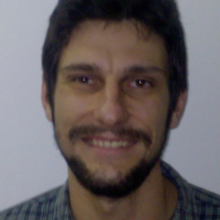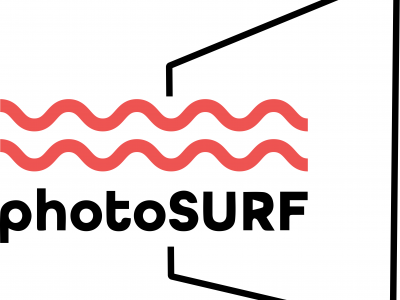

Dr. Demeridou is currently a postdoctoral fellow, her current research interests include two Dimensional Materials (2D), μ-Photoluminescence Spectroscopy (μ-PL), Raman Spectroscopy, Pulsed laser irradiation of the atomically thin lattice in a precursor gas atmosphere. Her research interests, also, lie in the area of Spin-Valley Polarization measurements in TMDs and the effect of carrier doping.She obtained her M.Sc. in master program “Microelectronics-Optoelectronics” in Physics from University of Crete, Greece in 2016. In 2014, she joined the “Ultrafast Laser Micro and Nano Processing” Group of the IESL, FORTH. She carried out her master thesis: “Photochemical Doping of mechanically exfoliated monolayer WS2”.She received her Bachelor degree in Physics from University of Crete, Greece in 2013.
Education
- 2021, PhD, Department of Physics, University of Crete, Greece.
- 2016, M.Sc, Department of Physics, University of Crete, Greece.
- 2013, B.Sc. Department of Physics, University of Crete, Greece.
Career
- February 2019 – May 2019, Teaching Assistant as a PhD student, at the postgraduate course “Advanced Photonic characterization of materials for energy applications”, Master Program: Nanotechnology for Energy Applications, Institute of Electronic Structu
- October 2017 – May 2017, Teaching Assistant as a PhD student, at the undergraduate course “Advanced Physics Laboratory”, Physics Department, University of Crete. Instructor: Prof. Eleftherios Iliopoulos.
- October 2013 – May 2014, Teaching Assistant as a Master student, at the undergraduate course “Advanced Physics Laboratory”, Physics Department, University of Crete. Instructor: Prof. George Kiriakidis, Prof. Eleftherios Iliopoulos.
- February 2013 – May 2013, Teaching Assistant as a graduate student, at the undergraduate course “Physics Laboratory III: Optics”, Physics Department, University of Crete. Instructor: Prof. Petros Rakintzis.
- October 2012 – December 2012, Practical Teaching at the Experimental General Lyceum of Heraklion, at the undergraduate course “Teaching Physics I”, Physics Department, University of Crete. Instructor: Prof. Ilias Perakis.
Interests
- Mechanical Exfoliation of Two Dimensional Crystals
- Pulsed laser irradiation in a precursor gas atmosphere
- Raman Spectroscopy
- Micro-Photoluminescence Spectroscopy
- Micro-Differential Reflectance Spectroscopy
- Spin Valley Polarization measurements
- Cryogenic System

Dr. Eleftheria Babaliari is a Postdoctoral Researcher at the
Foundation for Research and Technology - Hellas (FORTH), Institute of
Electronic Structure and Laser (IESL). She received a Bachelor’s, a
Master’s and a Ph.D.’s Degree in Materials Science and Technology from
the University of Crete, Greece in 2012, 2015 and 2020, respectively.
During the undergraduate program, she joined the Polymer Group of the
IESL, FORTH where she worked on the rheology of hard spheres colloidal
suspensions and binary mixtures. Ιn the master’s degree program, she
joined the Biomaterials Lab of the Department of Materials Science and
Technology in Crete where she studied the effect of microfluidics in
biomaterials for bone tissue engineering applications. During her
Ph.D., she joined in 2015 the Ultrafast Laser Micro and Nano
Processing Group of the IESL, FORTH performing research on the laser
microstructured scaffolds for tissue engineering under dynamic cell
culture conditions. Her current research interests include the
development of laser-microstructured scaffolds for tissue engineering
applications, using ultrafast laser structuring, and the study of the
combined effect of flow-induced shear stress and surface topography on
tissue growth.
Education
- 2015 – 2020, Doctor of Philosophy, Materials Science, University of Greece, Crete
- 2012 - 2015, Master of Science, Materials Science, University of Crete, Greece
- 2008 - 2012, Bachelor, Materials Science, University of Crete, Greece
Career
- 01/2021 – present, Postdoctoral Researcher at Foundation for Research and Technology – Hellas (FORTH), Institute of Electronic Structure & Laser , Heraklion, Crete, Greece
- 01/2023 - 12/2023, Assistant in the laboratory of laser and modern physics, University of Crete, Greece
- 09/2022 - 12/2022, Assistant in the laboratory of laser and modern physics, University of Crete, Greece
- 01/2021 – 12/2021, Assistant in the laboratory of laser and modern physics, University of Crete, Greece
- 01/2020 – 12/2020, Assistant in the laboratory of laser and modern physics, University of Crete, Greece
- 12/2015 – 10/2020, PhD thesis: Laser microstructured scaffolds for tissue engineering under dynamic cell culture conditions, Foundation for Research and Technology – Hellas (FORTH), Institute of Electronic Structure & Laser , Heraklion, Crete, Greece
- 11/2019 – 12/2019, Assistant in soft matter lab, Department of Materials Science and Technology, University of Crete, Greece
- 01/2019 – 12/2019, Assistant in the laboratory of laser and modern physics, University of Crete, Greece
- 11/2018 – 12/2018, Assistant in soft matter lab, Department of Materials Science and Technology, University of Crete, Greece
- 01/2018 – 12/2018, Assistant in the laboratory of laser and modern physics, University of Crete, Greece
- 11/2017 – 12/2017, Assistant in soft matter lab, Department of Materials Science and Technology, University of Crete, Greece
- 01/2017 – 12/2017, Assistant in the laboratory of laser and modern physics, University of Crete, Greece
- 09/2016 – 12/2016, Teaching Assistant in chemistry lesson, Department of Materials Science and Technology, University of Crete, Greece
- 09/2015 – 12/2015, Teaching Assistant in chemistry lesson, Department of Materials Science and Technology, University of Crete, Greece
- 02/2014 – 04/2015, Master thesis: Microfluidics in biomaterials for bone tissue engineering applications, Foundation for Research and Technology - Hellas (FORTH), Institute of Electronic Structure & Laser – Biomaterials Lab (University of Crete)
- 09/2014 – 12/2014, Teaching Assistant in chemistry lesson, Department of Materials Science and Technology, University of Crete, Greece
- 10/2013 – 01/2014, Teaching Assistant in chemistry lesson, Department of Materials Science and Technology, University of Crete, Greece
- 09/2011 – 10/2012, Diploma thesis: Rheology of hard sphere colloidal suspensions and binary mixtures, Foundation for Research and Technology - Hellas (FORTH), Institute of Electronic Structure & Laser, Heraklion, Crete, Greece
- 2/2011 – 05/2011, Practical exercise: Rheology of hard sphere colloidal suspensions and binary mixtures, Foundation for Research and Technology - Hellas (FORTH), Institute of Electronic Structure & Laser, Heraklion, Crete, Greece
- 02/2011 – 05/2011, Assistant in chemistry lab, Department of Materials Science and Technology, University of Crete, Greece
- 09/2010 – 12/2010, Teaching Assistant in chemistry lesson, Department of Materials Science and Technology, University of Crete, Greece
Interests
- Microfluidics
- Laser Processing
- Tissue Engineering
- Biomaterials
- Polymers
Awards/Prizes/Distinctions
- Best Poster Presentation Award – IESL, «Combined effect of shear stress and topography on Schwann cells behavior E. Babaliari, P. Kavatzikidou, A. Mitraki, Y. Papaharilaou, A. Ranella, E. Stratakis» 12th FORTH Retreat, Patra, Greece, 15 – 16 October 2019
- 2017, Hellenic Foundation for Research and Technology (ELIDEK) (PhD Scholarship)
- 2016 – 2019, State Scholarships Foundation (IKY) (PhD Scholarship, «ΕSPΑ 2014 – 2020»)
- 2016, Onassis Scholarship, Onassis Foundation (PhD Scholarship)
- 2011 – 2012, State Scholarships Foundation (IKY) (Undergraduate Scholarship)
- 2011 – 2012, Soukouli Scholarship, University of Crete (Undergraduate Scholarship)
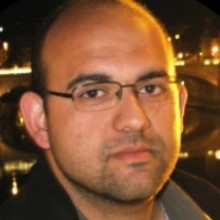
Education
- 2006, M.Sc in Microelectornics & optoelectornics, Physics Dpt, University of Crete, Herakleion, Greece
- 2003, B.Sc, Physics Dpt, University of Crete, Herakleion, Greece
Career
- 09/2006 - today, Clean room process engineer at Microelectornics Researhc Group, FORTH - IESL, Greece
Interests
- Fabrication Process Design and Development
- Lithography
- III-V Semiconductors processing
- Wide Band Gap Semiconductors
- MicroElectroMechanical Systems (MEMS)
Education
- 2011, Ph.D. in Protein Biotechnology, Biology Department, University of Crete, Greece
- 2007, M.Sc. in Protein Biotechnology, Biology & Chemistry Departments, University of Crete, Greece
- 2004, M.Sc. in Microelectronics – Optoelectronics, Physics Department, University of Crete, Greece
- 2002, B.Sc. in Physics with specialization in Microelectronics, University of Crete, Greece
Career
- 5/2015 - today, Contractual Researcher, Biosensors Lab & Microelectronics Research Group (MRG), FORTH - IESL, Greece
- 10/2011 - 02/2015, PostDoctoral Researcher, BioMEMS laboratory, Mechanical Engineering, University of Michigan, USA
Interests
- Biosensors
- Lab-on-a-chip systems
- MEMS
- Opto- and Micro-fluidics
- 3D printing

Education
- 2014, Ph.D. in Nanophysics, Laboratoire National des Champs Magnétiques Intenses, Toulouse, France
- 2011, M.Sc. in fundamental Physics, Dpt. of Physics, University Toulouse III, France
- 2009, B.Sc in Fundamental Physics, Dpt. of Physics, University Toulouse III, France
Career
- 2017 - today, Postdoctoral fellow, Microelectornics Research group, FORTH - IESL, Greece
- 2014 - 2016, Postodoctoral fellow, Crete Center for Quantum Complexity and Nanotechnology (CCQCN), University of Crete, Greece
Interests
- graphene ballistic devices
- 2 dimensional transition metal dichalcogenide growth by Chemical Vapor Deposition (CVD) method
- 2 dimensional transition metal dichalcogenide electronics
- Novel devices for telecommunications and high speed (THz) electronics
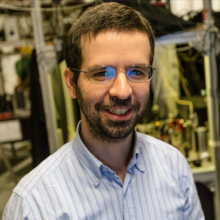
Georgios Vasilakis is the leader of Quantum Magnetometry lab, which aims to harness the quantum interface between light and atomic ensembles in order to perform quantum enhanced magnetometry.
Before founding the new lab he was a postdoctoral researcher at the BEC and Mattewaves Group with Dr. Wolf von Klitzing at FORTH-IESL, and in the Quantop Group of Eugene Polzik at Niels Bohr Institute, University of Copenhagen. He got his Ph.D. from Princeton University, where he completed his thesis "Precision Measurements of Spin Interactions with High Density Atomic Vapors" under the supervision of Michael Romalis.
Education
- 2011, PhD, Princeton University
- 2006, M.S., Princeton University
- 2001, BSc. Physics Department, University of Crete
Career
- 2016-2020, Postdoctoral Researcher, BEC and Mattewaves Group (Wolf von Klitzing), FORTH-IESL
- 2012-2016, Postdoctoral Researcher, Quantop (Eugene Polzik), Niels Bohr Institute, University of Copenhagen
Interests
- Quantum enhanced atomic-optical magnetometry
- Quantum interaction of light with atomic-ensembles
- Precision measurements with light and warm atomic-vapors
- Magnetometry in biomedicine
Giannis joined the Cretan Matter Waves group in March 2015 to work on the ESA-OBST project. He holds a diploma in electrical and computer engineering (2012) from the Aristotle University of Thessaloniki, Greece. He received his master's degree from the inter-institutional graduate program “Vision and Optics”, of the University of Crete finishing his master thesis entitled "Vibrational and angular stability of optical systems for space applications" in December 2015. He continued for his PhD working on BEC 1 and OBST, graduating in October 2021. He is now a postdoc on BEC 1 and OBST.

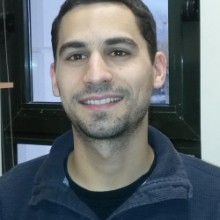
Dr. Odysseas Tsilipakos received the diploma and Ph.D. degrees from the Dept. of Electrical and Computer Engineering, Aristotle University of Thessaloniki (AUTh) in 2008 and 2013, respectively. From 2014 to 2015 he was a Postdoctoral Research Fellow with AUTh. In 2016 he started working as a Postdoctoral Researcher at the Institute of Electronic Structure and Laser (IESL), Foundation for Research and Technology Hellas (FORTH) as a member of the Photonic-, Phononic-, and Meta-materials (PPM) group. Since 2021 he is the Principal Investigator of the PHOTOSURF Research Project funded by the Hellenic Foundation for Research and Innovation. His research interests span metasurfaces and metamaterials, plasmonics and nanophotonics, resonators and cavities, nonlinear optics in resonant structures and waveguides, 2D photonic materials, and theoretical and computational electromagnetics. He is a Senior Member of IEEE and a member of The Optical Society (OSA).
Education
- 2013, PhD, School of Electrical and Computer Engineering, Aristotle University of Thessaloniki, Greece
Career
- Oct 2020 - today: Adjunct Lecturer, Department of Materials Science and Technology, University of Crete, Greece
- Nov 2021: Visiting Researcher, Consiglio Nazionale delle Ricerche (CNR), Rome, Italy
- Jun 2016 - Aug 2016: Visiting Scholar, Ames Laboratory and Iowa State University, Ames, Iowa, US
- Jan 2016 - today: Postdoctoral Fellow, Institute of Electronic Structure and Laser, Foundation for Research and Technology Hellas, Greece
- Jan 2014 - Dec 2015: Postdoctoral Fellow, School of Electrical and Computer Engineering, Aristotle University of Thessaloniki, Greece
Interests
- Photonics
- Metasurfaces and metamaterials
- Graphene and 2D photonic materials
- Nonlinear optics
- Optical cavities and resonators
- Guided-wave and integrated optics
- Tunable, switchable, and reconfigurable optical components
Awards/Prizes/Distinctions
- Aug 2019: Have been awarded the IEEE Senior Member grade
- Mar 2019: Recipient of Stavros Niarchos Foundation–FORTH Postdoctoral Fellowship
- Jan 2014: Recipient of postdoctoral excellence research fellowship from the Research Committee of the Aristotle University of Thessaloniki
- Apr 2012: Best student paper award in SPIE Photonics Europe 2012 (Nanophotonics Conference)
- Mar 2011: Recipient of “Heracleitus II” research scholarship for PhD studies
- Nov 2009: Recipient of Scholarship from the Greek State Scholarships Foundation (IKY) for PhD studies




